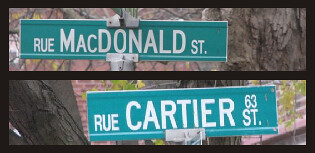We started this series covering Wellington and By. Among the other figures of historic influence over the history of Ottawa are, of course, the Prime Ministers of Canada and several of their more influential allies.
Sandwiched between Elgin Street and the Rideau Canal for over 125 years are salutes to the first of the post-Confederation PMs, Sir John A Macdonald himself, and his chief ally from the francophone side of the aisle, George-Étienne Cartier. Built at some point around 1877 or 1878, with Cartier Street as an offshoot of Cartier Square — now the home of Ottawa’s City Hall and Court House — the two streets are parallel north-south routes through that part of Centretown, also known to some mapmakers and real estate salespeople in recent decades as the “Golden Triangle”.

Sir John A.’s history is well known to most Canadians, but the quick and dirty version of the backstory for those who’ve never heard it before is this: Born in Scotland, part of that region’s diaspora within what was once called “British North America”, Macdonald became a politician of note and substance in the mid-19th Century with a career that began with Kingston’s town council and continued into first the Ontario legislature, and then “Upper Canada”. Initially a skeptic about the proposal to unite the remaining British holdings in North America under a shared banner in the wake of the American Civil War, Macdonald came to be one of its leading supporters and subsequently, Canada’s first and most successful post-Confederation Prime Minister.

Sir George-Étienne is less well known, but his part in Confederation’s beginnings is no less important. From law school to membership in les Fils de la Liberté during the Papineau rebellion of 1837 to service as the campaign manager of Louis-Hippolyte Lafontaine, first Prime Minister of the Province of United Canada and co-author of the concept of “responsible government”. Cartier went on to co-author the legislation that created the Grand Trunk Railway, and he later played a founding role in the Great Coalition, the forerunner of the Confederation Conferences of 1864-1867. Québec’s presence as a founding province of present-day Canada is arguably Cartier’s greatest contribution to the country.

